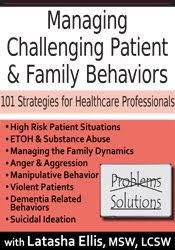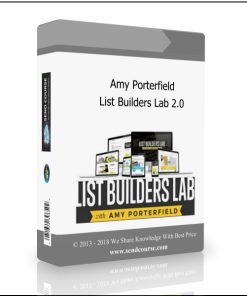Managing Challenging Patient & Family Behaviors: 101 Strategies for Healthcare Professionals – Latasha Ellis | Available Now !
$199.00 Original price was: $199.00.$56.00Current price is: $56.00.
Managing Challenging Patient & Family Behaviors: 101 Strategies for Healthcare Professionals – Latasha Ellis | INSTANTLY DOWNLOAD !
- High-Risk Patient Situations
- ETOH & Substance Abuse
- Managing the Family Dynamics
- Anger & Aggression
- Manipulative Behavior
- Violent Patients
- Dementia-Related Behaviors
- Suicidal Ideation
In today’s healthcare environment, professionals are challenged to do more with less. Reduced staffing and increased (at times the seemingly unrealistic) demands from patients, family members and other visitors can all contribute to burnout. Adding to the complicating factors, you are continually expected to achieve optimal patient outcomes, ensure safety and quality goals, and strive for even higher levels on satisfaction scores.
In this interactive seminar, expert clinician, Latasha Ellis, MSW, LCSW, will provide you with practical tips and tools that you can use immediately when faced with challenging patient and family behaviors. This program includes practical strategies to help you cope with difficult situations like aggression, dementia and attention seeking behaviors while maintaining patient and staff safety. The day will be filled with opportunities to apply many of these strategies through real patient situations, case studies and interactive discussions. Don’t miss this chance to learn techniques you can implement successfully with your most difficult patients.
OUTLINE
Difficult Patient Encounters
- Why are challenging behaviors presenting?
- Five key strategies to use with all patients
Major Categories of Challenging Behaviors
- Anger and aggression
- Acute crisis (sexual assault, domestic violence)
- Suicide ideations
- Severe mental illness & psychiatric diagnosis
- Personality disorders
- Substance abuse
- Dementia vs. delirium
Contributing Factors of Difficult Encounters
- Patient and Family
- Patient’s story and valuing diversity
- Family dynamics
- Mediation
- Provider’s Role
- Self-awareness
- Managing our emotions and bodies
- Emotional intelligence
- Situational/ Environmental factors
Prevention Strategies
- Early detection/warning signs
- Identifying and supporting needs and strengths
- Avoid the misuse of power
- Effective communication as key
- The Interactive Model
- Motivational interviewing (empathy, empowering)
Intervention Strategies
- The concept of “Blending”
- Nonverbal Blending
- Verbal Blending
- Encountering Aggressive Behavior
“Post-vention” Strategies
- Conflict resolution
- Effective reinforcement
- Limit setting and consequences
- Debriefing
Beneficiaries of Effective Management
- Patient
- Family
- Healthcare provider
- Staff
OBJECTIVES
- Demonstrate, through role play, motivational interviewing skills to identify causes of behavior.
- Discuss effective strategies to address real-life communication challenges.
- Describe interventions for problem families.
- State new interventions for high-risk patient populations.
- Describe your own interpersonal effectiveness when working with patients.
- Define approaches for various violent patient profiles.
Tag: Managing Challenging Patient & Family Behaviors: 101 Strategies for Healthcare Professionals – Latasha Ellis Review. Managing Challenging Patient & Family Behaviors: 101 Strategies for Healthcare Professionals – Latasha Ellis download. Managing Challenging Patient & Family Behaviors: 101 Strategies for Healthcare Professionals – Latasha Ellis discount.
1 review for Managing Challenging Patient & Family Behaviors: 101 Strategies for Healthcare Professionals – Latasha Ellis | Available Now !
Add a review Cancel reply
Related products
Ecommerce
Ecommerce
Ecommerce
NLP & Hypnosis
Ecommerce
Ecommerce












Emilia Potter –
As described, thank you | Managing Challenging Patient & Family Behaviors: 101 Strategies for Healthcare Professionals – Latasha Ellis